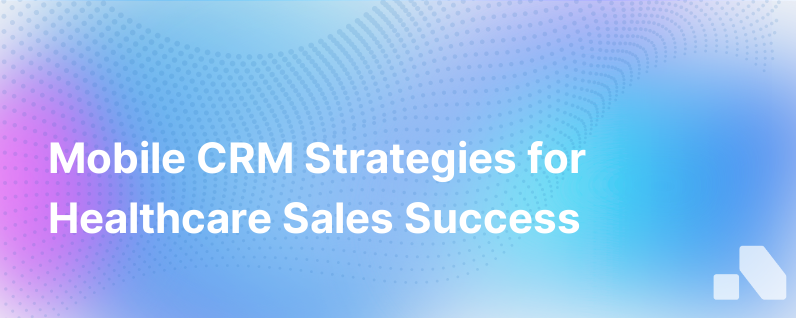
The healthcare industry is a domain governed by urgency, critical decisions, and a perennial need for accessibility. Healthcare sales representatives play a vital role here, acting as a pivotal link between drug manufacturers and healthcare providers. For these reps, mobility isn't merely convenient - it's non-negotiable. A mobile Customer Relationship Management (CRM) solution in the hands of healthcare reps can transform patient outcomes and accelerate the delivery of innovative healthcare solutions.
The Imperative for Mobile CRM in Healthcare Sales
In today’s fast-paced healthcare environment, sales reps must keep up with the rapid flow of information and the continuously changing availability of healthcare professionals. A mobile CRM provides healthcare reps with real-time access to data, enabling them to adjust strategies on the fly, comply with industry regulations, and provide up-to-date information to healthcare providers, ultimately enhancing patient care.
Key Benefits of a Mobile CRM for Healthcare Reps
- Real-Time Data Access: The most up-to-date information is at the healthcare reps’ fingertips, whether they are in the field or not. This allows them to provide accurate data to healthcare providers, ensuring better patient outcomes.
- Increased Productivity: Mobile CRM allows reps to record visit notes, access sales materials, and complete administrative tasks on-the-go, which increases their face time with healthcare providers and decision-makers.
- Enhanced Compliance: The pharmaceutical industry is tightly regulated. A mobile CRM helps to document interactions correctly, ensuring compliance with legal requirements and industry standards.
What to Look for in a Mobile CRM for Healthcare Reps
1. Usability and User Experience (UX)
In the field, healthcare reps don’t have time for complicated software. The UX of a mobile CRM should be intuitive, requiring minimal clicks to access data, schedule appointments, or enter information. Streamlined navigation and an interface aligned with the user's daily tasks are crucial for adoption and effectiveness.
2. Seamless Integration
The CRM should seamlessly integrate with the rep's existing workflows, including email, calendars, and other operational systems like billing, inventory, and patient management systems. This integration ensures crucial data flows freely between systems, saving time and decreasing the potential for error.
3. Robust Security
Given the sensitivities around patient data and strict regulations like HIPAA in the United States, the mobile CRM provider must offer robust security measures, including data encryption, secure login procedures, and the ability to remotely wipe data if a device is lost or stolen.
4. Offline Access
Connectivity can't always be guaranteed, especially in rural or newly developed areas. A mobile CRM for healthcare should offer offline access to critical data and allow reps to input new data, queued to sync once a connection is re-established.
5. Customizability
Healthcare organizations vary greatly in size, structure, and process. A one-size-fits-all CRM solution is often not feasible. The platform should be highly customizable to match unique business models and adapt to the evolving industry landscape.
6. Analytics and Reporting
A mobile CRM needs robust analytics and reporting capabilities. It should not only capture relevant data but also provide insight into trends, performance, and potential areas for improvement.
Implementing a Mobile CRM for Healthcare Reps
Step 1: Identify the Needs
Before implementing a mobile CRM, it’s essential to understand and document the specific requirements of healthcare reps, compliance regulations they must adhere to, and the goals of the organization.
Step 2: Select the Right Vendor
Not all CRMs are created equal, especially concerning healthcare. Choose a vendor with experience and a track record in the healthcare industry, ensuring they understand the unique challenges.
Step 3: Tailor the CRM to Your Workflow
Work with the vendor to customize the CRM, so it aligns with the unique processes and workflows of your healthcare reps. This customization includes setting up integrations with other systems in the healthcare organization.
Step 4: Prioritize Security
Ensure that data protection is a fundamental aspect of the CRM system—plan for regular audits and compliance checks to maintain stringent security standards.
Step 5: Provide Comprehensive Training
To optimize the mobile CRM's benefits, reps need comprehensive training tailored to their tech-savviness and familiarity with CRM platforms. This training should be ongoing as updates and new features are rolled out.
Step 6: Access and Analyze Data
Empower management and sales leadership to access real-time data, scrutinize sales performance and uncover insights that can refine sales strategies and processes.
Step 7: Solicit Feedback and Adjust
Gather feedback from the field frequently to identify any issues or areas for improvement. A great mobile CRM solution evolves with the needs of its users and the dynamics of the industry.
Conclusion
The right mobile CRM solution equips healthcare reps with a powerful arsenal to navigate the complexities of modern healthcare sales. By adopting a mobile CRM, reps are not only fostering rich, informed conversations with healthcare providers but also contributing to a more responsive and effective healthcare system.
In this shifting healthcare environment, the criteria of success are no longer merely the number of closed deals but the delivery of value at the point of patient care. A mobile CRM elevates the rep's capacity to meet this heightened benchmark, ensuring that the expanding healthcare needs of the population are met with the requisite speed, efficiency, and knowledge.